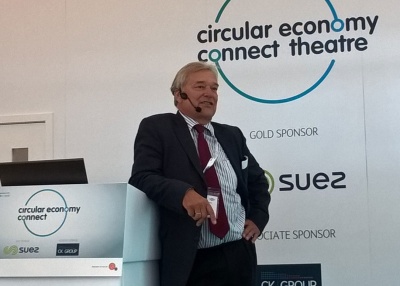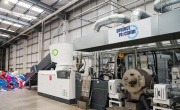EU policy advisor criticises UK recycling practices

Falkenberg, who was replaced as Director-General for Environment two weeks ago and is now Senior Advisor for Sustainable Development at the European Political Strategy Centre (EPSC), was speaking at the RWM Exhibition yesterday (16 September) to give an update on the European Commission’s Circular Economy Package.
The German was reluctant to give details on what the package would contain as work in Brussels ‘is ongoing’, but did say that the commission still plans to present it before the end of the year, most likely in early December.
His message was clear however: “Waste is out. There is no more waste. Linear approaches are over.”
‘Peculiar’ co-mingling
Falkenberg was addressing the different levels of intervention needed in various member states when he criticised the UK’s attitude towards recycling collection and waste disposal.
He said: “All of Europe minus the UK tells me - industry, NGOs, academics – tells me that separate collection is key. In the UK there is the approach that we can collect co-mingled waste as effectively as separate waste. It’s a very peculiar approach.
“It’s not for me to say how it is done, what I would like to see is the outcome, and at the moment the UK is recycling considerably less than many of the separate collection systems on the continent, and the UK is still putting 37 per cent of municipal waste into landfills, when others are at zero.”
There were suggestions among some in the audience that Falkenberg had misconstrued the UK definition of ‘co-mingled’ to mean the mixing of dry and organic materials in the same recycling container.
He said during his presentation: “If we continue to put everything we don’t like into one bin from paper to plastic to electronic waste to organic waste and we do what we have done in the past and dump it in the landfill there is no way that we can economically reuse and get back at the minerals and natural resources that are in there.
“But if we separately collect our waste streams then we have the technology, and we are beginning to see the investments taking place because these investments are remunerative.
“The UK was not a particularly good child in the waste handling class of Europeans. Some five years ago you were still landfilling over 50 per cent of your municipal waste but you’ve introduced landfill taxes and we have seen how when the cheap but wasteful polluting option of landfilling is beginning to be closed how then recycling and energy recovery are growing.”
Regulations transposing the EU’s revised Waste Framework Directive were introduced at the beginning of this year stating that where ‘technically, environmentally and economically practicable’ (TEEP) UK local authorities were to switch to separate kerbside collection of waste paper, metal, plastic and glass. To date, however, none in England that are currently running partly or fully co-mingled recycling services have switched to a kerbside sort system, typically citing economic barriers..
Incineration aversion and export practices also questioned
Falkenburg also questioned the UK’s approach to incineration: “We have wide differences in member states, it strikes me that in the UK it seems to be more difficult to build an incinerator than a nuclear plant. I don’t know why, I cannot rationally explain it.
He gave the example of the Spittelau incinerator, which lies in the centre of a residential district in Vienna and processes around 250,000 tonnes of household waste every year.
According to Falkenberg, the incinerator emits as much pollution into the air as one of the 60 lorries that brings waste to it. He concludes: “Hardly anyone is going to wonder about the health risks of those lorries and yet they are 60 times bigger than what the incinerator produces.”
Indeed, the UK policy of exporting waste to European countries for use in incinerators also puzzled Falkenberg: “I’m still always surprised when I see the UK is exporting a lot of solid municipal waste to incinerators in Germany and Sweden. They are very grateful for the jobs, but fundamentally within the waste economy it does make sense to apply the proximity principle.
“The closer to where we produce the waste the better we can treat it, and the less we have to transport certain types of waste across European borders the more efficient our economy will become.
“This does not mean we should close markets, but we should look for proximity solutions so that all Europeans from all parts benefit from moving into a circular economy.”
Package will move resources to the ‘heart of societies’
During the presentation, Falkenberg told the waste and resources professionals in attendance that the circular economy package must make the waste hierarchy “more of a reality”, with a primary focus on avoiding waste in the first place.
He said: ”We don’t need all the packaging materials, we can be a lot more efficient in selling products, in the ways in which we consume by producing less waste.
“We need to structure our economies to move in [a circular direction]. We need to do it for environmental reasons, and we need to do it for competitiveness. Europe is the least well-endowed with natural resources, so if anyone is to start thinking about more efficient in the use, reusing these materials, it is going to be Europe.”
The process of new technology being marketed every year, encouraging consumers to throw out perfectly adequate old models in favour of newer ones came in for particular criticism. Falkenberg put emphasis on the need to design products to last longer, with fewer materials and a simpler process of repurposing the materials at the end of a product’s life.
He concluded: “We need to put waste from the fringes of our societies and put it right at the heart. The circular economy must put raw materials, must put minerals, at the heart of the economy.”
Read a selection of responses to the Circular Economy Package’s public consultation.




